
Summer is here and that could mean a family road trip is on the calendar! Before you hit the open road, it is important to make sure your vehicle is up for the trip! Make your vehicle maintenance part of your pre-trip preparation.
Change Your Oil
Check your oil level and the date that you last got an oil change. If you’re close to needing new oil, stop by your local Fast Lube Plus for a quick and convenient oil change service.
Ensuring you have enough oil in your vehicle and a fresh filter will help your car perform at its best!
Pack Your Summer Vehicle Emergency Kit
Summer road trips are very popular. While you may have taken all the precautions before your trip, you may still find yourself needing an Emergency Kit if your vehicle breaks down or you get into an accident. It’s important to make sure you have enough supplies for your entire family.
A quick list of items to include in your kit are the following:
A flashlight, antiseptic wipes, Band-Aids, tweezers, iodine, duct tape, small tools (wrench, pliers, scissors), and road flares . You should also consider including items such as sunscreen, blankets, bottled water, and non-perishable snacks.
Items to Have During the COVID-19 Pandemic:
- Hand sanitizer
- Disposable gloves
- A Mask
- Disinfectant wipes
Top Off Your Fluids
While making sure your engine’s oil is very important when performing routine maintenance, it’s also important to make sure your brake fluid, engine coolant, windshield washer fluid, power steering fluid, and water for the radiator are filled to correct levels for safe vehicle operation.
Making sure your vehicle’s fluids are at the appropriate levels will help keep your vehicle running smoothly, as well as keep you and your family safe.
Make sure your AC is running COOL
North Carolina summers can be brutal. Before any long-distance road trips, take a quick test drive to make sure that your vehicle’s AC is blowing strong. If you notice a decrease in your cool air, bring your vehicle into your local Fast Lube Plus to have your AC diagnosed.
Check Your Tires & Brakes
When checking your tires, make sure the vehicle has been idled and the tires are cool. Inspect all four tires for cuts, gouges, and bulges.
You can check your tread by inserting a quarter upside down into the grooves.
When checking the tire pressure go by the number in your vehicle manual- not the number on the tire!
To check your breaks, take a test drive around town. If you feel a vibration when applying the brakes or hear a grinding sound, head over to your local Fast Lube Plus for a brake inspection!
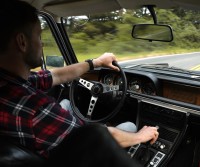
Inspecting your car and making sure it is in great shape is an important thing to do before any road trip. You should consider an oil change (if you are anywhere near the recommended mileage), check your tire tread and tire pressure, make sure your AC is working properly, and even check your cabin air filters. High summer temperatures can be brutal if you’re stranded or stuck waiting for a tow or roadside service; so it’s also important to make sure your vehicle has a Summer Emergency Kit.
Being prepared for a roadside emergency is important. So, what should be in your vehicle’s Summer Car Emergency Kit?
- First Aid Kit: Make sure to include some bandages, ointment, gauze, adhesive tape and tweezers, single-use cold packs, sunscreen stick and for those with life-threatening allergies, include an EpiPen.
- Jumper Cables: A set of jumper cables is sure to provide an effective solution and is a key item! They are beneficial to have throughout the year, not just during the colder months!
- Flash Light: Always a great idea for owners to have in their vehicle.
- Items to Fix a Flat Tire: Carjack, lug wrench, and a spare tire are essential to your flat tire tools and are an important component of your Summer Emergency Kit. Packing a tire sealant and gauge to repair a small hole on your own can also be quite useful.
- Small Toolkit: You may not need a lot of tools, but keeping a small tool kit with basics such as a few different size screwdrivers and pliers and an adjustable wrench.
- Hazard Flares and Reflective Triangles: If you ever break down and need to work on your vehicle, Reflective Triangles, and/or LED flameless flare are essential items that will help to keep you safe.
- Non-Perishable Snacks: Car trouble can leave you stranded for a period of time. Pack non-perishable snacks that won’t melt; like crackers, granola bars, dried fruit, and nuts. Don’t forget bottles of water to stay hydrated.
Summer is here and many families will be traveling by car this year for their vacation or day trips. Prepare your vehicle and pack your Summer Emergency Kit today to ensure the safety of you and all your passengers for your next trip!
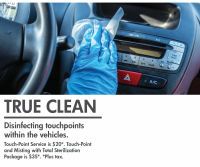
We are happy to announce that Fast Lube Plus is now providing the True Brand True Clean Touch-Point Service and Touch Point and Misting with Total Sterilization Package.
True Brand ALL-IN-ONE TRUE CLEAN GERMICIDE is a MULTI-SURFACE GERMICIDAL llAY with 70% alcohol formulated to clean and destroy the growth of harmful microbiological organisms on high-traffic touch areas. It removes bacteria and
disinfects inanimate objects and surfaces from organisms such as bacteria, viruses fungi while also helping deodorize.
Our team will disinfect all high traffic areas such as door handles, door panels, steering wheels, shifter knobs, seat belts and more. Contact us today!
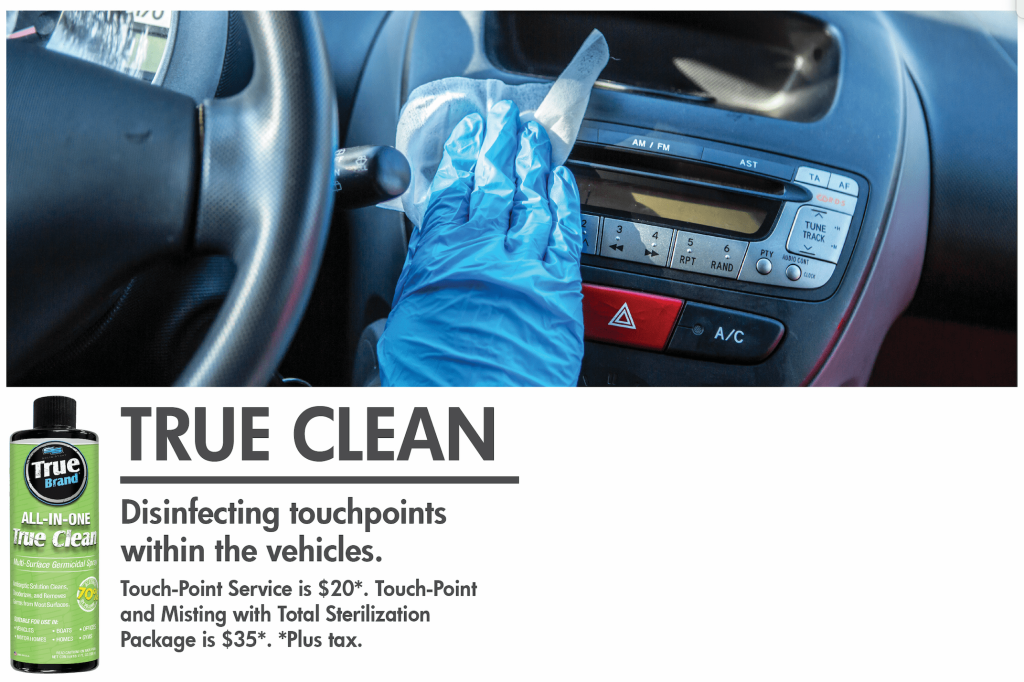
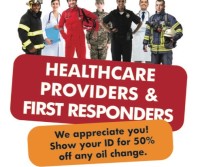
Now for a limited time, show your professional I.D. to get 50% Off Any Oil Change.
During the COVID-19 crisis, Fast Lube Plus is offering 50% off Oil Change for Healthcare Providers and First Responders to thank them for being on the front lines. We appreciate you! Just show your ID for 50% any oil change.
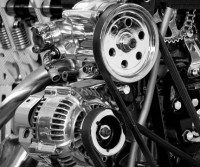
Your engine is a metal box with explosions inside it. Thinking about it that way helps illustrate why the things get incredibly hot; were it not for proper cooling, your engine would literally melt together under its own heat and pressure!
Naturally, your car’s engine cooling is one of the most critical parts of its operation. Luckily, it’s typically obvious when something is wrong! Here’s a breakdown of how your car’s cooling system works and how to keep it in shape.
The Basics
So why does an engine generate heat? As stated previously, your car burns gasoline many, many times per second. The heat from that burning is typically absorbed by the engine block, the giant hunk of metal that forms the shell of your engine.
Though many classic cars were air-cooled – including Porsches until 1998 – modern engines require liquid cooling. Lots of tiny channels in your engine block are filled with antifreeze, which is specially engineered to soak up as much heat as possible.
That anti-freeze – driven by your car’s water pump – takes a lengthy journey through your engine before winding up in the radiator, typically on the front of your car. The radiator uses the natural airflow of your car’s movement (sometimes with a fan) to cool the liquid, before returning it to the block where the cycle begins anew.
Failure Points
Because liquid cooling systems have many different parts, there are a few frequent and obvious failure points.
- The Water Pump: because the pump turns on a bearing, eventually that bearing will become worn out and seize up. When that happens, liquid can no longer move! The water pump should be changed out any time you get your timing belt changed to prevent this from happening.
- The Radiator: because they take quite a beating from the elements, radiators can develop leaks over time. The more leaks there are, the faster you lose coolant, and the more likely you are to overheat.
- Hoses: the many rubber hoses connected to the cooling system can crack and break, especially in colder temperatures.
- Fluid: certain types of antifreeze degrade over time. Other types may not mesh well with your particular car, causing a buildup of brown gunk. Make sure you only use the brand of coolant recommended by your manufacturer.
Maintenance
The best way to maintain your cooling system is also the cheapest one: look! Check for puddles of coolant under your car, check hoses for obvious cracks, and open your radiator cap once in a while to monitor rust and gunk.
Need a professional to look at your cooling system? Bring your car in for an oil change at Fast Lube Plus, and while we’re at it we’ll take a look at your cooling system! We serve customers across the Triangle. Come in today, and let’s get you rolling!
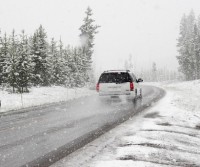
Winter is coming! With the possibility of snow (or, here in the Triangle, mostly slush and ice) looming, you need to know how to get around responsibly. A lot of common sense advice applies for winter driving, but there are some special tricks to make it easier…and some that are merely myths or misconceptions.
Myth: All-Wheel Drive Is All You Need
Whether you have a tricked-out Jeep or a humble Subaru, the snow is a great chance to feel some well-earned smugness about your purchase. As others cower indoors, you take to the city streets without fear…right?
Well, sort of. All-wheel drive is unquestionably better in the snow for getting traction. However, it does not help you stop, which requires both driver skill and capable brakes. You can still skid on ice or lock up the brakes. Some vehicles with part-time all-wheel drive (like the Honda CR-V) are also not true AWD, and only engage it when a loss of traction is detected.
The big takeaway here? Enjoy your advantage, but be careful.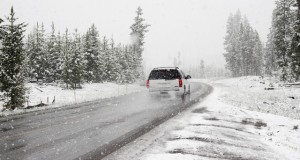
Myth: Underinflate Your Tires for Better Traction
This myth is most amusing because it makes sense on paper. If your tires are less inflated, they’ll “sag” a bit, giving you a greater contact area with the road.
But like most armchair science, this doesn’t hold up in the real world. Where most of us live, the roads are plowed or at least pre-treated when snow’s in the forecast. So while that additional traction can help on gravel roads, even on a slightly icy road you actually lose that traction advantage. According to Car Talk, most modern tires are designed to cut through road snow at their proper inflation; underinflating them ruins that engineering and therefore their effectiveness.
Instead of DIY tricks, invest in a good pair of snow tires.
Myth: Always Warm Up Your Car
Do you let your car idle before you start it in the winter? Your heart is in the right place, but current technology means this is mostly unnecessary.
The myth comes from older cars with carburetors, devices that mix fuel and air for delivery to the engine. At chilly temperatures, carburetors could malfunction. Modern cars use fuel injection, which deals just fine with cold weather.
The myth also stems from oil circulation; many older engine oils were extra thick in the winter, and warming them up let them more evenly coat fragile engine parts. But newer oils are purposely designed for winter weather (that’s what the “W” in 10W-40 or 5W-30 means.) So while you should let your car idle for a little bit – maybe a minute – that’s all it needs. Just drive gently until the car is fully warmed up.
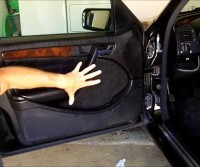
The average American commute is a painful 26.4 minutes long! That means lots of time in your driver’s seat, lots of oily fingers touching the dials, and plenty of dirt and grime from getting in and out.
Knowing that, shouldn’t you properly maintain your car’s interior? It’s easy, affordable, and anyone can do it! Not only does it make that commute more comfortable, but it helps the cabin materials last longer and look great.
Dashboard
Dashboards are typically made from either leather, vinyl, or plastic (or a combination of the three.) Each type of surface requires its own special care, but leather is the most fickle. Your owner’s manual will likely indicate if your dash has a special material.
For vinyl, use mild water and a clean microfiber cloth. While some people prefer the shiny aesthetic of Armor All, the greasy finish is unpleasant and it can crack thinner plastics. If you have to use something stronger than water, consider a diluted all-purpose cleaner or non-greasy Meguiar’s. Be extremely careful cleaning plastics around radios and HVAC controls, as they can scratch easily.
Leather – including seats – requires special care. Get leather cleaner from a trusted brand like Meguiar’s or Mother’s, and follow up with a high quality leather conditioner. As mentioned above, always read your manual for specific pointers!
Carpet and Upholstery
The obvious solution here is to vacuum thoroughly and often. Your corner store’s coin vac works well enough, but personal models offer variable speed control and the ability to spit air out. For vacuuming hard to reach places (especially under seats) it can help to blow debris out before vacuuming it up. You should also invest in a sturdy brush for foot wells and carpet mats. Be gentle, though!
Much as house carpet requires regular shampooing, your car’s upholstery sometimes needs to get wet. While professional detailers have steam machines, you can shampoo yourself with a gentle brush and the proper soap. Just allow plenty of time, because air drying takes a while.
Glass
Good ol’ Windex works wonders on car windows, but you can also use a mixture of water and vinegar. The real key lies in the applicator; use a soft, high quality microfiber towel for the best results. To reduce streaks, make sure you buff properly: firm, in a circular motion.
Does your car need under the hood maintenance? Fast Lube Plus offers oil changes, inspections, and other routine maintenance to drivers in Cary, Holly Springs, Fuquay-Varina, Apex, Morrisville, Garner and the greater Raleigh-Durham area. Contact us today and let’s keep your car running great!

Taking your car for an inspection can feel like a hassle. But in reality, your yearly NC inspection is not just a legal todo: it’s essentially a check-up. It’s an important tool for identifying early signs of wear and tear and for scheduling needed maintenance.
When the skilled technicians at Fast Lube Plus inspect your vehicle, we look at two areas: safety and emissions. Today we’re going to clarify what that means and why it matters!
Safety Inspections
Your car’s most basic functions are boring compared to your in-dash GPS or leather seats, but they’re also the most important. Any vehicle on the road is expected to have a few key parts work perfectly:
- Brakes (including the parking brake)
- Headlights
- Windshield wipers
- Signal, brake, and plate illumination lights
- Steering
A basic list, indeed. But the safety inspection serves a much more practical purpose of getting an experienced mechanic to look at your car, and in the process of the inspection they can notice items going bad. Things like your brakes, tires, and other wear items are best replaced before they break. If they get too far, you (and your wallet) could be in serious danger!
Avoid surprises by checking for those basic functions ahead of time. Listen for squealing brakes, and have a friend look at your tail and brake lights to make sure they work.
Emissions Inspections
This is where things get a bit more complicated. Since 1995, all new gas-powered cars have come with the OBDII (On-Board Diagnostics) system. This system can detect specific faults with your car – though not necessarily the cause – and store a code in its memory. A technician or off-the-shelf reader can read these codes.
When there’s a problem, your car’s check engine light comes on. Unfortunately, a CEL is a one-way ticket to a failed inspection! Many CELs are linked to unacceptable levels of certain gases in your exhaust, which is why it matters so much.
It’s easy to ignore a check engine light when your car runs normally, but it typically indicates a problem that will either a) get worse or b) cause a failed emissions inspection. Check it out early to prevent annoyances on inspection day!
Are you due? Fast Lube Plus performs certified North Carolina State Inspections at our locations in Apex, Fuquay-Varina, Cary, Garner, Holly Springs, and Morrisville. Drop by anytime and our experts will take care of you!
It’s easy to ignore a check engine light when your car runs normally, but it typically indicates a problem that will either a) get worse or b) cause a failed emissions inspection. Check it out early to prevent annoyances on inspection day!
Are you due? Fast Lube Plus performs certified North Carolina State Inspections at our locations in Apex, Fuquay-Varina, Cary, Garner, Holly Springs, and Morrisville. Drop by anytime and our experts will take care of you!
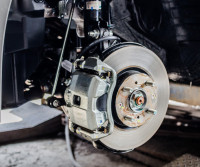
So much of car discussion is focused around going. How fast is it What kind of gas mileage? What’s the fuel tank range? But just as getting there is important, so is arriving, and that requires good brakes!
Brakes are an often overlooked maintenance item. They’re put off and ignored until they become dangerous. Do yourself a favor: learn about your brakes and learn how to take care of them!
There are two primary types of brakes, each with differing maintenance needs.
Disc Brakes
Disc brakes are by far the most popular type of brake. Their mechanism of action is simple: friction. A pair of metal parts called calipers hold pads composed of various metal or ceramic materials. These calipers are connected by tubes to a reservoir of fluid under your hood. When you press the brake pedal, the fluid is pressurized, clamping the pads down on a shiny, silver disc called a rotor. Since the rotors are attached your axle, this stops your car.
The most obvious wear item for disc brakes is the pads. These wear out at different intervals depending on what they’re made of; ceramic brake pads are expensive, but usually last longer. You may also need to have your rotors turned, basically resurfaced on a machine to renew their stopping power.
It’s a common myth that brake pads only need to be replaced when they start squeaking. In reality, squealing may already mean that your brakes are damaged! Worn pads can damage the calipers themselves, which are far more expensive to replace. Have your brakes inspected during any routine service to save you money in the long run.
Drum Brakes
Drum brakes are a cheaper, older style of brake that have less stopping power than discs. On lower-end models, you will sometimes see them used on the rear wheels. Since the front brakes do most of the work, rear drums are a safe way to save money in economy cars.
They work on the same principle of friction. The difference is that they lay inside a closed metal drum. When you press the pedal, metal strips called shoes press on the inside of that drum, causing friction and slowing down the car.
Even though your front brakes do most of the work, your rear brakes have one very important function: your emergency brake! Though they will last longer than your front brakes, it’s important to have your brake shoes regularly inspected.
Need new pads, shoes, or a brake fluid change around the North Carolina Triangle? Fast Lube Plus offers prompt brake service at fair prices. Come in today and let’s get you taken care of!
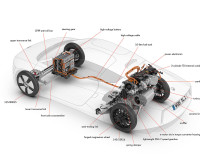
Unless you have an off-road or 4×4 vehicle, you likely never think about how your car’s power gets to the road. This is called your drivetrain, and it describes which wheels on your car receive power in order to move it forward. It matters a lot for understanding car marketing, maintenance, and how to drive in severe weather!
The last part isn’t as much of a concern here in North Carolina’s triangle, but it’s still important for the occasional blizzard or downpour. The first two matter year round, and make you a smarter consumer! Today we’ll talk about major kinds of drivetrains.
Front-Wheel Drive
Front-wheel drive – or FWD – is by far the most common drivetrain. This layout connects your engine to your front wheels, with the rear wheels rotating freely. FWD emerged in the 70s and 80s due to the compact layout – perfect for small cars during the fuel crisis – and lower building costs.
FWD cars do not easily spin out, making them ideal for the average driver. Engine weight over the drive wheels also makes them better than rear-wheel drive for bad weather. However, FWD cars struggle with high power engines and precision turning, making them a poor choice for sports cars. Exceptions to this rule include “sport compact” cars like the Volkswagen GTI.
Front-wheel drive cars have one unique maintenance item: CV axles. These complex mechanisms can wear out over time, and cost several hundred dollars to replace.
Rear-Wheel Drive
Rear-wheel drive (RWD) cars are the oldest type of drivetrain. They send power through a fast-spinning driveshaft to a differential that drives the rear wheels. Your steering remains in the front.
Rear-wheel drive is capable of much more power than front-wheel drive. As a result, it’s the layout of choice for sports cars, luxury cars, and trucks. However, RWD cars do not have the traction benefits of FWD, making them exceptionally poor choices for severe weather.
Unique RWD maintenance is mainly centered on the differential. Its fluid may need to be regularly changed.
Four-Wheel and All-Wheel Drive
Four-wheel (4WD) and all-wheel drive (AWD) operate on the same principle: applying power to all four wheels of a car. They differ in their marketing. 4WD is usually a part-time feature that the driver can turn on or off, like in many SUVs. AWD is usually on full-time (as in most Subarus) or activates when the car detects a loss of traction (like in the Honda Pilot or Nissan Rogue).
AWD and 4WD have superior traction in bad weather, allowing even the weakest engine to work its way out of snow. However, full-time setups lessen gas mileage, and even part-time setups add fuel-guzzling weight.
Full-time AWD cars must have their tires rotated regularly; uneven tread can cause the drive system to break. All setups may require regular changing of differential fluid.
Does your SUV, sports car or family sedan need maintenance? Fast Lube Plus offers service to all vehicles in the Triangle area. Call us today or drop by!
